Walter engineered the desperate gambit at the end of S3 (“Full Measures”) as an attempt to put himself in charge. He spends most of S4 trying to convince himself that he’s in charge, or that he could be. But every time he tries to act like he’s in charge, he’s reminded – either through visual cues or the machinations of others – that he’s not.
In S4E2 (“Thirty-Eight Snub”), Walter steels himself to kill Gus. He buys an illegal .38, practices with it, then drives to Gus’s house. He takes a moment in the car to psych himself up, signified in the show by the music mounting to a terrifying pitch. But then everything cools down as soon as Walter dons the black hat, becoming Heisenberg again.
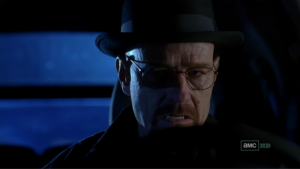
Walter gets out of the car and walks toward Gus’s modest suburban home. The camera tracks tight on his head throughout. As the audience, we’re ready for some quirky cinematography from our favorite drama. Maybe the camera will stick with Walter throughout, until …
His phone rings. It’s Tyrus. “Go home, Walter.”
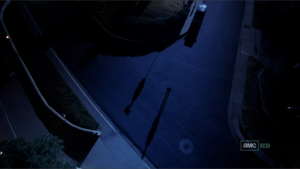
Okay, bad example. Walter was never really the shooter type. But he’s smart and cocky. Cocky enough to deliver (S4E6, “Cornered”) a dramatic monologue!
Who are you talking to right now? Who is it you think you see? Do you know how much I make a year? I mean, even if I told you, you wouldn’t believe it. Do you know what would happen if I suddenly decided to stop going in to work? A business big enough that it could be listed on the NASDAQ goes belly-up. Disappears! It ceases to exist without me. No, you clearly don’t know who you’re talking to, so let me clue you in. I am not in danger, Skylar. I am the danger. A guy opens his door and gets shot and you think that of me? No. I am the one who knocks.
After delivering this speech, Walter does what every criminal mastermind would: stammers a bit, wanders to the bathroom, peels off his shirt and takes a shower. The speech, please note, has the exact opposite effect of what’s intended. Instead of reassuring Skylar that Walter is in complete control and that she has nothing to fear, it provokes a fresh wave of fear in her and nearly drives her to another state.
All right, forget actions, forget words. What about an empty gesture? Can Walter prove he’s in charge by doing something every action movie hero does: walking away from an explosion? (S4E7, “Problem Dog”)
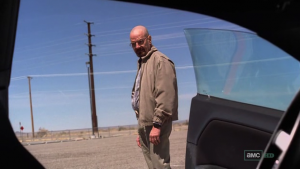
By the way, you look fantastic
Well, no.
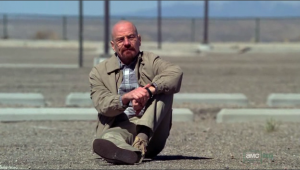
In your boots of Chinese plastic.
This entire season has been about Walter coming to grips with the fact that he can not be in charge. He can’t take a seat at the head of the table. He isn’t a badass or a natural leader or a businessman. He only gets Jesse to do what he wants by haranguing Jesse with pedantic verbal abuse until the boy caves. And Jesse goes along with it because that’s what he was born to do. He’s a natural pawn.
Jesse got into his current mental state by being manipulated into doing Walter’s dirty work for him at the end of S3 (“Full Measures”). The plan was always for Walter to kill Gale, not Jesse, but that plan fell through when Mike got the drop on them. So Jesse had to kill Gale to save Walter’s life.
Throughout S4, Jesse lives up to the same role. He becomes a pawn in Gus’s plan to free himself of Walter. Gus uses Mike to build up Jesse’s confidence (S4E5, “Shotgun”). Soon, Jesse becomes a trusted member of the organization (S4E6, “Cornered”) and later, a key part of Gus’s revenge on the cartel (S4E10, “Salud”). Jesse is rising through the ranks, but it’s as a skilled worker, never as management or even owner. His skills are valued; his opinions, never.
We get this visually reinforced in the front half of the season through something I like to call “ToolCam.” ToolCam was first introduced in the bottle episode “Fly” in S3. A small camera (probably a GoPro HD), mounted on the end of a brush, gave a jarring view of a lab implement being cleaned.
ToolCam returns in two episodes in S4. First, in S4E2, “Thirty-Eight Snub,” the camera is mounted on a Roomba as it crawls through Jesse’s debauched apartment. The Roomba bumps and whirs through stacks of sleeping druggies until it reaches one conscious spaz. He promptly picks it up and starts trying to disassemble it.
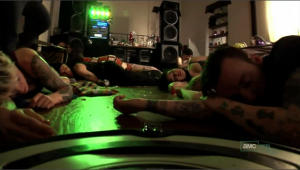
The other time is in S4E6, “Cornered,” where Jesse helps Mike track down some hijacked meth. To lure a tweaking addict out of his house, Jesse grabs a shovel from Mike’s car and goes to dig in the lawn. The ToolCam is mounted on the blade of the shovel. It bobs along behind Jesse’s head as he carries it across the street, reversing toward Jesse’s face as he prepares to dig.
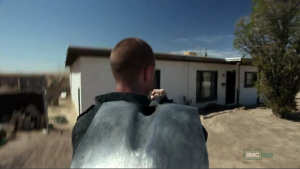
(We also get a reverse perspective, mounted on the video game gun Jesse uses, in S4E4, “Bullet Points”)
Both these images give us a perspective on what it’s like to be a tool: an implement in the hands of a skilled user. It’s no coincidence that both times the tool is in Jesse’s possession: once in his house, once in his hands. Jesse is a tool himself. He’s a pawn of the men around him. That’s the saddest part of the Jesse Pinkman tragedy: that Jesse is going to be used, then cast aside, for no crime other than being conveniently at hand.
Jesse is a tool and Walter is a laborer. Or rather, Jesse is a precision lathe and Walter is a skilled lathe operator. Both are essential parts of a competitive manufacturing process. But they’re disposable if the bottom line gets in the way.
S4 has been about both Walter and Jesse realizing their status in that way. Jesse makes the realization first, and the revulsion that grips him throughout the season is the result. He tries to drown his despair in gross sensation – lights, noise and touch in high quantities – but gets nowhere. He returns to his counseling group but can’t get the judgment he wants. He’s rusting away until someone picks him up, polishes him off and starts putting him to use again: first Mike, then Gus, then, by S4E12, Walter once more.
Walter denies his status for longer than Jesse does. He tries to make a deal with Mike, appealing to his fear of Gus, but to no avail. He tries outsourcing his cleaning work to a few laundromat employees, but ends up costing them their jobs. It’s not until he’s in the desert with a bag over his head that he realizes he isn’t the boss. He’s never going to be the boss. He’s the one on his knees, not the one standing.
So what’s his solution? To bring down the company entirely.
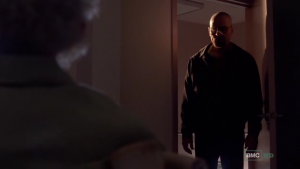
Any second thoughts? Then let's get to work.
Walter engineers his strike on Gus in S4E12 and E13 not because he wants to sit at the head of the table. Those days are beyond him. Walter no longer wants to become management. He wants to live in a world without management. Whether this means he wants to produce and distribute meth on a local scale again – a sort of anarcho-syndicalist co-op – or whether it means he wants to quit the industry entirely, we can’t say yet. We’ll have to wait until S5 to find out.
But Walter clearly does not mean to take over Gus’s operation. He not only kills Gus and his bodyguard Tyrus, but he kills them in a public manner that links Gus, and his entire business, to the Mexican drug cartels. He then shoots Gus’s last two remaining henchmen and, with Jesse’s help, burns down the entire drug lab. Gus’s operation is now torched, scattered and under a DEA microscope. Walter’s days of taking charge of the operation are over.
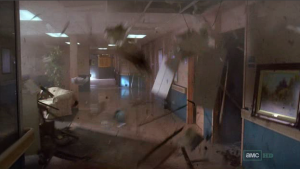
Could have picked a different screencap. Didn't. You're welcome.
The crises and story arcs of the earlier seasons of Breaking Bad were personal and familial. They depicted people grappling with inner demons, or balancing their duty to their families against their own desires. S4 takes this a step farther out and depicts the battle between the worker and the owner: labor vs. management. Does it pick sides or pass judgment? At the end of S4E13 (“Face/Off”), labor is the only side left standing. But labor has had to do some pretty despicable things, including poisoning a child, to get to that point. And given the number of deaths involved, you might not call the outcome a victory, even if Walter does.
So where does that leave us for S5, the final season?
Hank’s theories about Gus Fring have been vindicated by Gus dying with the last surviving member of a Mexican drug cartel. The connection between Fring and the meth trade is now indisputable. Given Hank’s tenacity when he had only a hint to go on, we can be sure that Hank is now going to cling to this investigation until every possible question – including the identity of Heisenberg – has been answered.
Gus’s death takes the threat off of Walter’s head, but only for the time being. There’s a reason the cartel assassin didn’t shoot when he had Gus in his sights and it’s probably the same reason the cartel killed Gus’s partner, instead of him, thirty years ago. Gus’s still undocumented past in Chile has been protecting him. Unfortunately, neither Walter nor Jesse know anything about it. So any repercussions that bowl them over will come as a surprise.
And oh yeah, Mike’s still out there.
The first few seasons have been about man vs. his internal demons. Man vs. his family. Man vs. his masters, here in S4. The scale has gradually grown wider, encompassing more and more of the world. Each season, Walter and Jesse have triumphed, but at an ever-increasing cost.
Given the forces in play, S5 will be about man vs. fate. And this is a battle that Walter might not win.
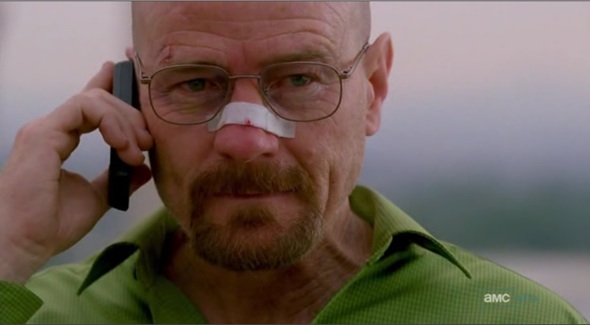
Remind me how small-time drug dealer and other vices are being replace by foreign competition and big drug cartel
Walt crosses the line to villain more and more frequently as the series progresses, and it’s only the use of perspective and the fact that he keeps on drawing the attention of even greater villains that keeps the audience from completely rooting against him.
* Walt had a chance to cover his costs peacefully, but rejected what he saw as charity. He chose to cook meth and put his life (and later his family’s life) at risk instead.
* Walt had a real, legal job, but he chased some tail and got himself fired, knowing he could fall back on meth. Wrong thing in the wrong way for the wrong reason.
* Walt forced his child to drink too much alcohol simply to assert his power over his own family. Wrong thing in the wrong way for the wrong reason.
* What Walt did to Jane — is that two out of three? Walt poisoning a child to regain an ally against the greater evil of Gus — even he knew there was a chance he might actually kill the kid. Walt sending his next-door neighbor into his house where she could easily have been killed — that’s at least bordering on two strikes.
And through it all, we’ve seen that Walt often enjoys holding power over others; he exulted in threatening those other meth-makers in the hardware store parking lot, he took pleasure in intoxicating his own kid to the point of making him sick, and he so desperately hates for others to get credit for his genius and badassery that he puts his operation at risk just when Hank is off his scent and reveals his conscious participation in violence to his wife rather than let her believe he’s still the victim. None of that is for even ostensibly noble reasons.
If this guy is a stand-in for skilled labor, that’s not very flattering for skilled labor. Again, he’s only been sympathetic because he’s had to crawl over greater villains (to keep himself as the sole breadwinner). You can bet on Walt becoming management in the final 16 episodes, he just couldn’t do it with the existing SuperLab, nor could he let it fall into the wrong hands. And Walt is going to be an obnoxious manager to work under.
Compelling stuff! I admit I completely forgot the “getting Walt Jr. drunk” vignette.
Ultimately, you’re right that Walt looks heroic only in comparison to the villains he goes against (Tuco, the twins, Fring, etc). However, I would take your analysis of Walt one degree deeper. Walt still thinks he’s doing all this for his family. However, Breaking Bad‘s genius – and Cranston’s talent – is in making it obvious to the audience that Walt’s behavior is only ostensibly to protect Skylar and his children.
Limiting ourselves to S4, let’s consider Walter’s “I am the one who knocks” monologue. It’s a clear temper tantrum on Walter’s part: his wife thinks he’s a victim, so he’ll show her!, etc. But he brings it up in the context of whether the White family needs to go to the cops. So there’s always the veneer, however thin, of familial obligation. Walter doesn’t bully his wife just because he’s in a bad mood. He bullies his wife because he thinks it’ll prove to her how strong he is.
Don’t discount the excuse that Walter’s family provides him. He needs that excuse in order to unleash that peevish anger.
I’ll echo that second comment a bit. There are some interesting parallels, and I realize the entire idea is to OVER-think this, but I don’t think Breaking Bad is at all meant to illustrate any kind of struggle between labor and capital, except around the margins. Walt has “made it” more than once, and his own pride–not any management types keeping him down–is what’s prevented him from cashing out. It happened before the show started, when he stormed away from the company because a woman rejected him, it happened shortly after, when that same woman and her husband offered him charity, it happened later on when he’d made a fair amount of money and no longer NEEDED much more, it happened again when his cancer went into remission, and it happened yet again when Gus gave him the one thing he wanted–a way out of his employment–and he threw it back in his face.
If Walt is meant to represent labor, then it means labor has all sorts of chances to enrich itself and live happily and contentedly, but that its own personal shortcomings or envy prevent that from happening.
By the by, I should add that despite my nitpickings, it’s a great premise and a good read, so thanks for that. :)
And I now realize I should have done more than skim that other comment, since BABF covered most of this already. D’oh.
I don’t think your correct in regards to Victor. Part of the point of that portion of that episode is that Victor can’t cook like Walt. He doesn’t know the chemistry, and he’s just going through the motions. If Victor could cook as well as Walt or Jesse, he may have just killed Walt and Jesse. Also, Victor was killed in part because he was seen at Gale’s apartment. That really doesn’t fit into Walt and Gus’ relationship. It’s just about Gus not tolerating any errors.
Gus’s killing of Victor can serve more than one purpose. All of the above reasons are valid considerations, but none of them answers why Gus would kill Victor brutally and right in front of Walt and Jesse. That killing was to send a message.
Oh, it was definitely to send a message. I just don’t think it is the message you posited. Of course, then it doesn’t fit into your theorem on the season, which has some point that I do agree with, so I see why you went with your interpretation.
I always thought that Victor wasn’t SUPPOSED to be learning Walt’s recipe. Victor took the initiative to learn it while he watched them. Gus didn’t want someone who thought for themselves… That could be dangerous.
What Gus valued was loyalty and obedience, not the ability to make meth. Victor wasn’t more valuable because he learned to cook, he was less valuable because he was no longer trustworthy.
The “Point” was just to show Walt and Jesse how cheap human life can be in that situation. Just how much power Gus had over them. He could kill them on a whim whether they could cook or not. It shows just how little value there was in knowing how to cook.
In both the scene with Victor and the flashback to Don Eladio and the “Chemist”, they start with the premise that knowing how to make meth is a valuable commodity. Walt goes on the entire “You need me” speech and Gus slits Victor’s throat. Don Eladio does the whole “Why do I need you” speech to Gus… And then kills the chemist. When Gale is killed, the reaction is really minimal… Gus could give a crap. He wasn’t even mad.
Part of Walter’s delusion is that they “need” him, and he couldn’t be more wrong. Season 4 sees Walt running around thinking he’s the center of the action while the audience knows he’s a peripheral entity to the fight between Gus and the Dons. Jesse knows Walt’s methods well enough to get 96% purity. The cartel has a roomful of chemists… And they really don’t care about the quality. As long as they don’t have to compete against better meth, then who cares if it 99% pure or 80% pure.
The only reason Walt’s “Blue Sky” was important is that it was once competition. The cartel isn’t going to compete with this, they’ll either co-opt it, or destroy it. Either way. Blue meth or not, they wanted Walter DEAD. His “skills” weren’t the thing keeping him alive like he thought. He was a pawn in the game between Gus and Tio Salamanca. That’s what kept Walter alive.
To take the labor analogy one step further… Those of us who think we are “skilled” labor and irreplaceable might find ourselves just like Walt.
Bonus Q: Who here thinks that Gale and Gus were in a relationship?
Gale and Gus would make a great a couple. Gus is probably an ungenerous lover and Gale probably smothers with affection so they balance out. Their fights over how many millimeters the silverware should be separated would be vicious.
I think season 5 will be Man vs. the Government. Hank is a pitbull and I really see Walt being caught in the end, but the law.
I love this post since the entire show is fresh in my mind. After marathoning the show for the past two weeks, I had one thought about today’s television in general. A horrible economy has made for great drama. Breaking Bad, Weeds and Hung are all shows about characters that take illegal, drastic jobs and dual identities in the name of providing for their family.
I don’t think it’s a coincidence that all of these involve a parental figure taking the initiative and risk. Given our current economic situation, it’s no wonder these shows are so successful. Breaking Bad is so well written, I think it would be successful regardless, but the job market in America as a backdrop makes these more plausible.
This is a good point. Now I’m trying to think of shows that have been successful during economic boom times. Arrested Development (2003-6) and Seinfeld (1990-98) come to mind. Maybe comedies in flush years and dramas in lean years? Need to look into this further.